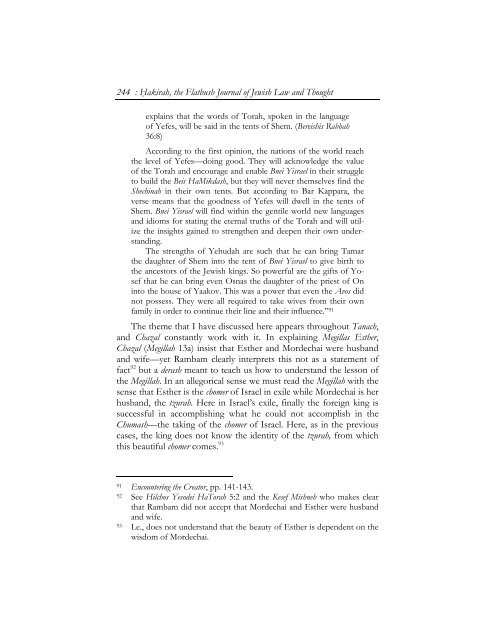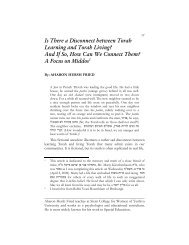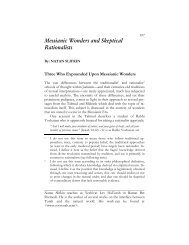Avraham and Sarah in Provence - Hakirah
Avraham and Sarah in Provence - Hakirah
Avraham and Sarah in Provence - Hakirah
You also want an ePaper? Increase the reach of your titles
YUMPU automatically turns print PDFs into web optimized ePapers that Google loves.
244 : Ḥakirah, the Flatbush Journal of Jewish Law <strong>and</strong> Thought<br />
expla<strong>in</strong>s that the words of Torah, spoken <strong>in</strong> the language<br />
of Yefes, will be said <strong>in</strong> the tents of Shem. (Bereishis Rabbah<br />
36:8)<br />
Accord<strong>in</strong>g to the first op<strong>in</strong>ion, the nations of the world reach<br />
the level of Yefes—do<strong>in</strong>g good. They will acknowledge the value<br />
of the Torah <strong>and</strong> encourage <strong>and</strong> enable Bnei Yisrael <strong>in</strong> their struggle<br />
to build the Beis HaMikdash, but they will never themselves f<strong>in</strong>d the<br />
Shech<strong>in</strong>ah <strong>in</strong> their own tents. But accord<strong>in</strong>g to Bar Kappara, the<br />
verse means that the goodness of Yefes will dwell <strong>in</strong> the tents of<br />
Shem. Bnei Yisrael will f<strong>in</strong>d with<strong>in</strong> the gentile world new languages<br />
<strong>and</strong> idioms for stat<strong>in</strong>g the eternal truths of the Torah <strong>and</strong> will utilize<br />
the <strong>in</strong>sights ga<strong>in</strong>ed to strengthen <strong>and</strong> deepen their own underst<strong>and</strong><strong>in</strong>g.<br />
The strengths of Yehudah are such that he can br<strong>in</strong>g Tamar<br />
the daughter of Shem <strong>in</strong>to the tent of Bnei Yisrael to give birth to<br />
the ancestors of the Jewish k<strong>in</strong>gs. So powerful are the gifts of Yosef<br />
that he can br<strong>in</strong>g even Osnas the daughter of the priest of On<br />
<strong>in</strong>to the house of Yaakov. This was a power that even the Avos did<br />
not possess. They were all required to take wives from their own<br />
family <strong>in</strong> order to cont<strong>in</strong>ue their l<strong>in</strong>e <strong>and</strong> their <strong>in</strong>fluence.” 91<br />
The theme that I have discussed here appears throughout Tanach,<br />
<strong>and</strong> Chazal constantly work with it. In expla<strong>in</strong><strong>in</strong>g Megillas Esther,<br />
Chazal (Megillah 13a) <strong>in</strong>sist that Esther <strong>and</strong> Mordechai were husb<strong>and</strong><br />
<strong>and</strong> wife—yet Rambam clearly <strong>in</strong>terprets this not as a statement of<br />
fact 92 but a derash meant to teach us how to underst<strong>and</strong> the lesson of<br />
the Megillah. In an allegorical sense we must read the Megillah with the<br />
sense that Esther is the chomer of Israel <strong>in</strong> exile while Mordechai is her<br />
husb<strong>and</strong>, the tzurah. Here <strong>in</strong> Israel’s exile, f<strong>in</strong>ally the foreign k<strong>in</strong>g is<br />
successful <strong>in</strong> accomplish<strong>in</strong>g what he could not accomplish <strong>in</strong> the<br />
Chumash—the tak<strong>in</strong>g of the chomer of Israel. Here, as <strong>in</strong> the previous<br />
cases, the k<strong>in</strong>g does not know the identity of the tzurah, from which<br />
this beautiful chomer comes. 93<br />
91 Encounter<strong>in</strong>g the Creator, pp. 141-143.<br />
92 See Hilchos Yesodei HaTorah 5:2 <strong>and</strong> the Kesef Mishneh who makes clear<br />
that Rambam did not accept that Mordechai <strong>and</strong> Esther were husb<strong>and</strong><br />
<strong>and</strong> wife.<br />
93 I.e., does not underst<strong>and</strong> that the beauty of Esther is dependent on the<br />
wisdom of Mordechai.
















